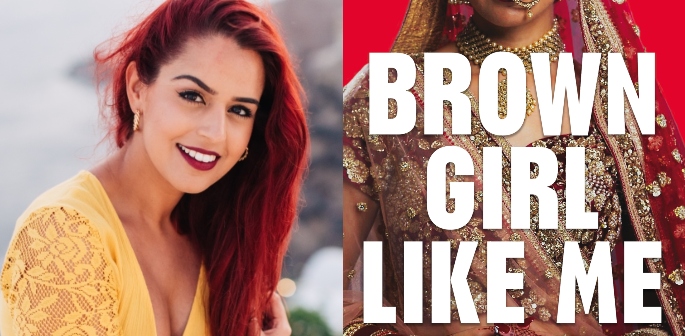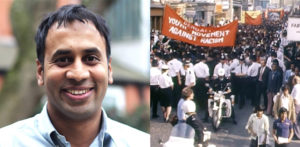"So, ultimately, we figure out what we need to do better"
Award-winning spoken word artist, Jaspreet Kaur, is publishing her stunning debut book, Brown Girl Like Me in February 2022.
The unique memoir is an inspiring look into the difficulties that South Women have faced for numerous years.
But, this is not just an insightful declaration of empowerment. The book is a toolkit designed to equip women with the confidence they need to navigate an intersectional identity.
From East London, Jaspreet Kaur is a gracious literary. Her work focuses on positive social change, stigmas, and historical issues in both the South Asian and wider communities.
Starting out her uplifting journey through poetry, Jaspreet is adamant about reimagining the landscape of South Asian women.
Growing up, she was trying to understand ‘taboo’ problems in her own culture.
Beauty standards, the female body, microaggressions, menstruation, and feminism were all prominent aspects of Jaspreet’s upbringing. Many of these are still prevalent in modern society.
Struggling with her own mental health, there was no guidebook to help Jaspreet or numerous other young girls in a similar mindset.
That was the foundation for Jaspreet to create Brown Girl Like Me. The book is a startling yet captivating account of difficult topics that need addressing.
Interviews with impeccable South Asian women, academic insights and an unfiltered description of culture make their way into the book.
However, Jaspreet cleverly describes how to manage being a brown feminist without rejecting your own culture. As there is an outdated ideology that outspoken South Asian women aren’t ‘fitting in’ to social norms.
Though there is nothing normal about silencing urgent conversations for change. Therefore, this guidebook serves as a vital component on how to grow up as a marginalised yet opinionated brown woman.
DESIblitz spoke with Jaspreet about her influences, Brown Girl Like Me and the importance of breaking down certain stigmas.
Can you tell us a little about yourself?

My name is Jaspreet Kaur, I am an educator, poet, and writer from London.
My academic background is in both history and gender studies, and I spent six years teaching history, sociology, and politics in high schools across London.
I’m currently a Research Fellow at Birkbeck University’s Politics Department. My love for poetry began when I was 13, at a time when I was using poetry as my form of therapy.
In 2015, I finally plucked up the courage to share my poetry with the world, and my journey as ‘Behind the Netra’ began.
Since then, I’ve been using the power of poetry for social, political, and cultural change.
I have specifically been looking at gender discrimination, mental health stigma, and the postcolonial immigrant experience, performing on stages across the UK.
I’ve always been the biggest bookworm for as long as I can remember. You’ll always find my head in a book.
In 2020, one of my biggest dreams came true when I signed a book deal for a book that I had been working on and researching for about seven years.
Enter Brown Girl Like Me, the essential guidebook for South Asian women and girls on how to deal with growing up brown, female, marginalised, and opinionated. I also write for radio and TV.
When I’m not writing away at my desk or teaching, you can find me in the kitchen cooking up a storm (I’m a big foodie!) or out in the garden spending time with my plants and veggies.
I’m a wife, sister, daughter, daughter-in-law, and the best auntie. I’m also a carer. And I have a dog, a cat, and five chickens.
What motivated you to create ‘Brown Girl Like Me’?
When I was younger, I always wished there was a guidebook on how to deal with growing up brown, female, marginalised and opinionated.
But there was no blueprint at the time. I remember growing up feeling like I didn’t see Asian women anywhere.
Our voices and experiences were missing from history books, positions of power, boardrooms, and TV screens.
When I did see Asian women, they would also be conveyed as passive, quiet and docile.
“But I knew brown women were so much more than that and I wanted the rest of the world to see that too.”
Every day, brown women are resisting, challenging and thriving. But where were their stories?
That’s when the idea for Brown Girl Like Me was born.
How did you gather your research for the book?
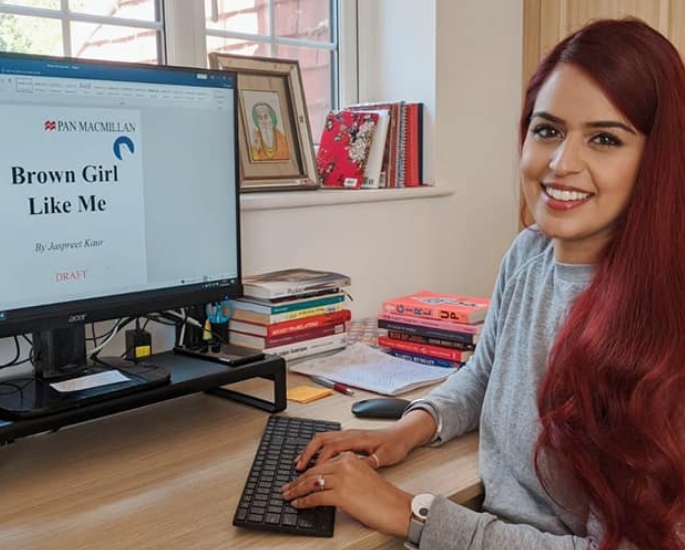
I completed my Masters in Gender Studies in 2014. Since then, I have been collating research and evidence on the issues that were most affecting South Asian women in the western world.
This included the media, the workplace, the home, education, mental health, culture, confidence, and the body. These themes went on to become the main chapters of the book.
As an academic, teacher, and poet, I wanted this book to reflect all three of my writing styles to educate and inspire readers in an accessible way.
Therefore, the book is interwoven with academic research, anecdotal stories, and interviews with brilliant South Asian Women of all walks of life.
From politicians to filmmakers, psychologists to schoolteachers, activists to Olympic athletes, bibis, and granddaughters, to show what life is really like for brown women in the diaspora.
I was able to connect with these women through social media, word of mouth, and the inspiring brown women in my own life.
I’m also thankful that my research fellowship at Birkbeck University gave me access to books, archives, journals, and research from a number of different universities and libraries around the world.
Why was it so important to explore such stigmatic topics in the book?
Much of the work that I do, be it through teaching, writing, or spoken word poetry, is to tackle taboo subjects within the South Asian community.
Especially when it comes to stigmatised topics such as mental health, menstruation, and sexuality.
For all generations of South Asian women to live happier and healthier lives, we must tackle these topics head-on. Whether that’s within our homes, communities, schools, or workplaces.
“We need healing from all the past and present traumas that brown women have had to face.”
That can only happen if we take time to talk about it and seek the help we might need.
That’s why I’ve been so open about my own mental struggles in the book, as well as my menstruation journey and self-confidence issues.
I want other brown women to know that they’re not alone in what they’re going through.”
“So, ultimately, we figure out what we need to do better as a society so that these problems don’t continue on into the next generation.”
Each chapter starts with a poem. What was the reasoning behind this?
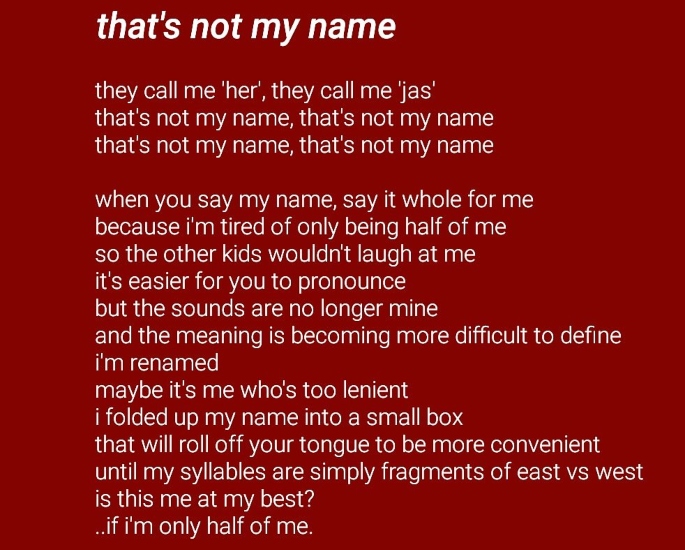
Each chapter starts with a snippet of my spoken word poetry.
Over the years, I’ve found that poetry can be such an accessible way to start discussion and dialogue around difficult topics.
It can sometimes be a softer entry point. The poems found in the book were my way of expressing the themes that the chapter then goes on to explore.
It also gives audiences a little flavour into the poetic work that I am yet to publish in the years to come.
Described as a ‘toolkit’, in what ways will the book help readers?
As a toolkit or guidebook to South Asian women and girls, I hope this book equips women with the confidence and tools they need to navigate the difficulties that come with an intersectional identity.
This book is essential reading for anyone wanting to build a fuller picture of women’s lives in Britain today.
It’s essential reading for South Asian women as well as people with an interest in feminism and cultural issues.
“I’m hoping it will educate, inspire and spark urgent conversations for change.”
But this book is not just for Asian women. It’s for brown men too. It’s for other communities who want to become better allies to women of colour.
It really is a book for society to better understand a significant part of our population.
“Ultimately, I want this book to foster a space for learning, understanding, and empathy.”
What was your creative process like when writing the book?
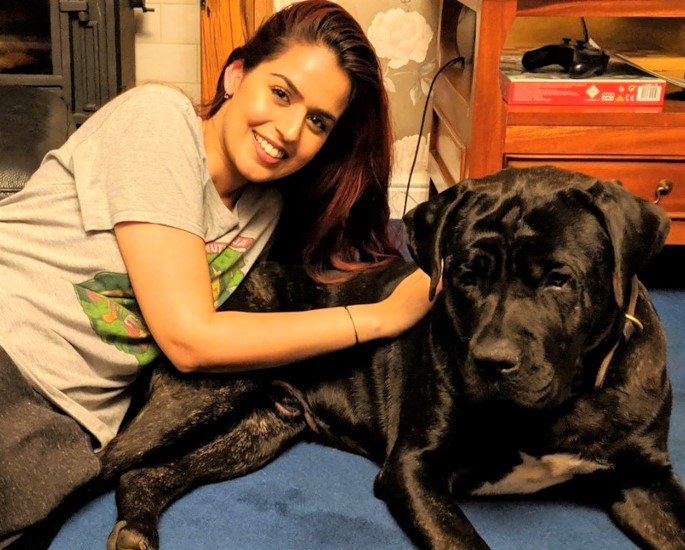
My writing process would usually have five distinct steps – prewriting, researching, drafting, revising, and editing.
Aside from those more formal stages, there would be several different things that I would do to help me with my writing flow or when I was suffering from dreaded writer’s block!
Meditation, time with my family and friends, or long walks with my gorgeous big doggie, Heera, would always help when I needed time to decompress.
My husband held my hand through the entire process. Whether it was talking through my initial ideas and reading through early drafts or keeping me going when I thought I had nothing left to give.
Which of the chapters affected you the most when writing it and why?
The first chapter of the book, ‘Brown and Down’, was the hardest to write.
I wanted to give myself permission to be vulnerable, so I shared experiences of my mental health struggles, anxiety, and depression.
“It inevitably resurfaced a lot of pain and trauma I had buried away. But I’m glad I did.”
I’m a big believer that vulnerability creates connections and can help others, so I’m glad I shared these personal moments in the book.
It reminds us that we’re not alone, and most importantly, ways in which I overcame obstacles and barriers.
Did you have to overcome challenges when creating ‘Brown Girl Like Me’?
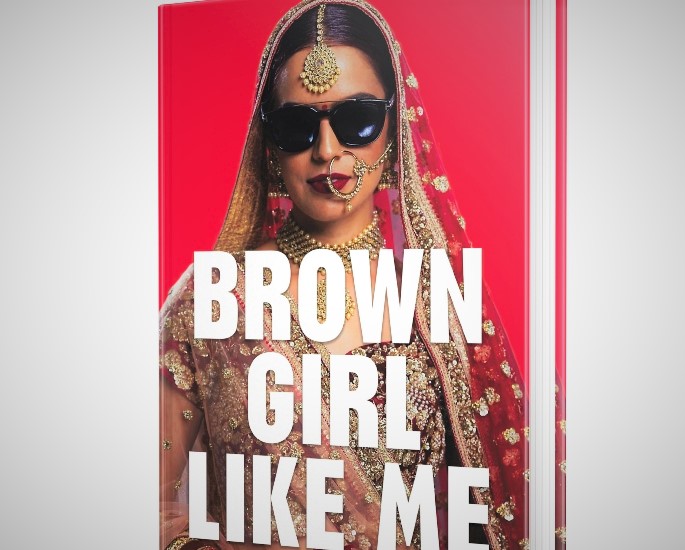
When I officially started writing Brown Girl Like Me, I’d just taken a break from teaching. I was about to move into my new office on Gower Street to begin my research fellowship.
I thought it would be a great place to write this book, in a quiet environment, walking distance from libraries and access to resources, and a great place to conduct my interviews.
But then, in March 2020, the whole world turned upside down. No more office. No more face-to-face interviews. And we all had the pressure of trying to survive a worldwide pandemic!
My husband and I set up a small desk in the corner of our bedroom. Beeji would be making saag downstairs, the rest of the family competing for Wi-Fi connection, and I began writing this book.
It wasn’t how I imagined writing my first book, but I believe that everything happens for a reason. Maybe a book for a brown girl like me was never meant to be written in a fancy office in central London.
Maybe I was meant to write this book in the home, one of the most complex arenas that a brown woman has to navigate. But also a haven, a place that holds so many of our stories.
Do you think the challenges British Asian women face will change?
With time, effort, and the changes that this book is fighting for, I hope I will see it decrease in my lifetime.
Ongoing son preference, violence against women, unequal division of labour, and unequal pay are just some of the injustices that are highlighted within the book.
“It shows what the world will continue to look like if we don’t start fighting.”
We need to start advocating for some of these changes to happen. I’m hopeful. To me, the stories of the women in this book show signs of that hope.
Did you learn anything new whilst writing the book?
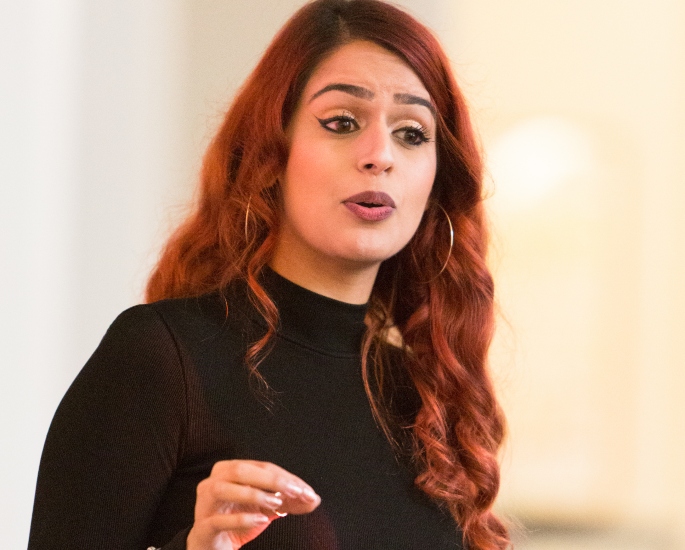
Alongside the academic research that went into the book, I was able to speak to around 200 different brown women. They had so much to teach me from their life lessons on family, culture, health, freedom, and love.
Some of the most interesting learnings came from Beeji, my grandma-in-law who I am a carer for. Her nuggets of wisdom are weaved throughout the book.
One of the most interesting findings was how brown women are so used to putting up with pain, in more ways than one.
Combine this with the lack of research and funding going into South Asian women’s health (compared to white-cis-men).
It means that women’s pain is often dismissed, their illnesses misdiagnosed or ignored. It’s known as the Yentl Syndrome.
What does being a British South Asian woman mean to you?
Pianoforte – it’s the mid-18th century Italian origin of the word piano. It means soft but strong. That’s what a British South Asian woman is to me.
Typically, “soft” is used as a negative attribute, meaning someone is weak or submissive. But I see soft in the most beautiful way; we are caring, loving, nurturing, and giving.”
But synonymously, with the strength of our ancestors and sisterhood growing around us, we are strong.
“We are resilient, intelligent, fierce, and powerful.”
With such a detailed perspective on her upbringing, social issues, and the need for cultural change, Brown Girl Like Me is destined for success.
Jaspreet Kaur’s inspiration and objectives for the book are so empowering.
She not only wants this to be a retelling of what many South Asian women go through but for it to guide young girls to avoid any internal struggles.
Using her poetic prowess, cultural richness and penetrating descriptions, Jaspreet’s talent is mesmerising. This has all contributed to her established yet fresh career, which speaks for itself.
The writer has won countless accolades on her journey so far and rightly so. These include the ‘We Are The City’ Rising Star Award in 2017 and performing in front of The Queen at the 2018 Commonwealth Service.
She was also voted as one of the Top 10 Inspirational Sikh Women in the UK in 2016 and Future’s ‘Asian Women of the Year’ in 2017.
However, she also gave a monumental Tedx talk titled ‘How Poetry Saved My Life’. The detailed performance explored how the power of poetry gave her the confidence to overcome her mental health struggles.
This same intimacy oozes out of her debut book. With such a flavourful vibrancy in the words, there’s no surprise to how influential Brown Girl Like Me will be.
Find out more about the incredible debut book here.




















































